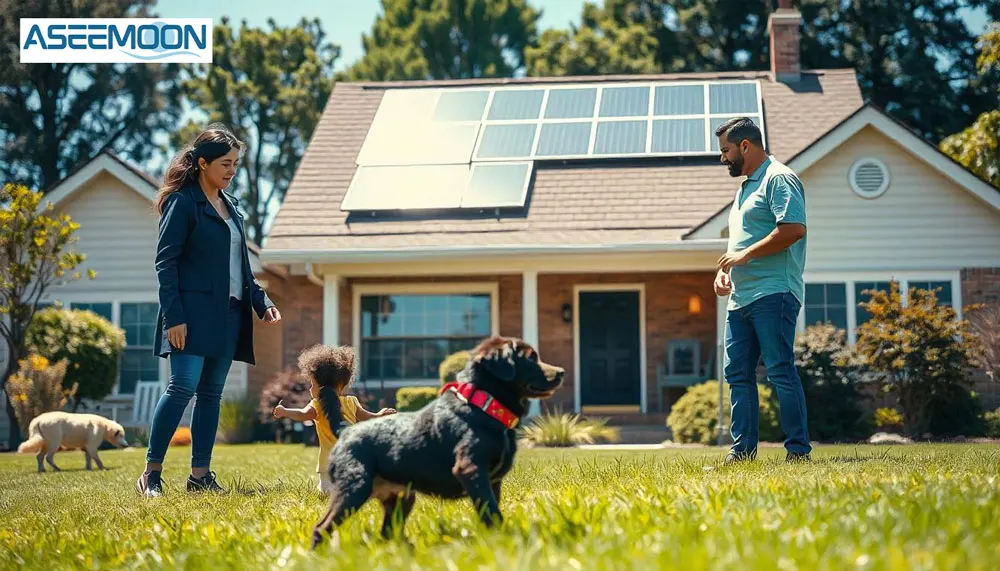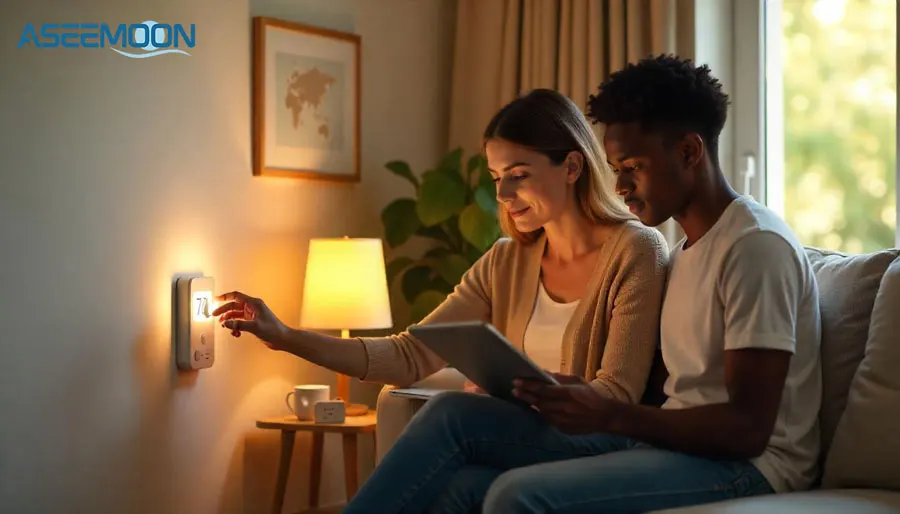Are you tired of paying high energy bills?
Reducing household expenses is a priority for many families, and one of the largest contributors to monthly costs is energy usage. From electricity and gas to water, these expenses can quickly add up. Fortunately, with a few practical adjustments, you can significantly lower your energy bills while also embracing a more sustainable lifestyle. Here, we explore some of the best energy-saving tips to cut costs without sacrificing comfort. Please stay with Aseemoon.
Best Ways to Lower Energy Bills
Following these tips will help you and your family save energy at home:
- Switch to LED Bulbs for Energy Efficiency cost savings
- Install a Smart Thermostat to Reduce Heating and Cooling Costs
- Unplug Devices to Avoid Wasting Electricity
- Improve Home Insulation to Save on Heating and Cooling
- Upgrade to Energy-Efficient Appliances
Switch to LED Bulbs for Energy Efficiency cost savings
One of the simplest yet most effective ways to save money on energy bills at home is by switching from traditional incandescent bulbs to LED bulbs. LEDs use up to 75% less energy than incandescent bulbs and last significantly longer. This means reduced electricity consumption and fewer replacements, saving both time and money.
- Why It Works: LEDs are designed to convert most of the energy they use into light, unlike incandescent bulbs that waste much of it as heat.
- Pro Tip: Install dimmable LED lights in high-use areas, such as the living room or kitchen, to adjust brightness according to your needs. Consider motion-sensor lights in less frequently used spaces like hallways to avoid wasting electricity.
- Additional Benefit: Although LED bulbs may cost more upfront, their longevity makes them a worthwhile investment. A single LED bulb can last up to 25 times longer than traditional options.
Install a Smart Thermostat to Reduce Heating and Cooling Costs
Heating and cooling costs account for a large percentage of most household energy bills. A smart thermostat helps optimize your home’s temperature settings by automatically adjusting to your schedule and preferences.
- Savings Insight: Using a smart thermostat can save families 10-15% on heating and cooling costs annually.
- User Tip: Some smart thermostats can be controlled remotely via smartphone apps, letting you adjust the temperature even when you’re away.
For instance, imagine saving $20 a month on heating during winter—over the course of a year, that adds up to significant savings!
Unplug Devices to Avoid Wasting Electricity
Many electronic devices consume electricity even when they’re turned off. This phenomenon, known as phantom load, accounts for a surprising portion of your energy bill.
Solution: Unplug devices when not in use or invest in smart power strips that cut power to devices in standby mode.
Examples of Energy Vampires:
- Phone chargers left plugged in.
- Microwaves displaying clocks.
- Gaming consoles in “rest mode.”
By addressing phantom load, you can reduce your energy bill by up to $100 per year.
Improve Home Insulation to Save on Heating and Cooling
A well-insulated home helps maintain a consistent indoor temperature, reducing the workload on your heating and cooling systems.
Key Areas to Insulate:
- Walls and attics: Primary areas where heat escapes.
- Basements: Preventing air leaks can significantly enhance efficiency.
- Windows and doors: Use weather stripping and caulking to seal gaps.
Cost vs. Savings: Proper insulation may require an initial investment but can lead to 20-30% reductions in heating and cooling costs.
Upgrade to Energy-Efficient Appliances
Older appliances consume significantly more energy than modern, energy-efficient appliances. Look for the ENERGY STAR label to ensure optimal performance and reduced power consumption.
Appliances to Prioritize:
- Refrigerators: Upgrading can save up to $150 over five years.
- Washing machines and dishwashers: These models use less water and electricity.
- Air conditioners and heaters: Modern units operate more efficiently, lowering costs.
Pro Tip: Check for government rebates for upgrading to energy-efficient appliances. These incentives can offset the upfront costs.
Additional Strategies for Lowering Energy Costs
It’s really important to make small changes to our everyday lives to help reduce the Energy bill:
- Use Natural Light to Reduce Lighting Costs
- Run Appliances During Off-Peak Hours
- Lower Water Heating Costs
- Invest in Renewable Energy Solutions
- Maintain Your HVAC System for Peak Efficiency
Use Natural Light to Reduce Lighting Costs
Take advantage of natural sunlight during the day to brighten your home. Keep curtains open to reduce reliance on artificial lighting.
- Bonus Tip: Place mirrors strategically to reflect sunlight into darker areas of the room. This simple trick not only saves energy but also enhances the aesthetic appeal of your home.
Run Appliances During Off-Peak Hours
Utility companies often charge lower rates during off-peak hours, typically in the evening or late at night.
- How to Plan: Contact your utility provider to find the exact off-peak hours in your area.
- Example: Running your dishwasher at night instead of during peak hours could save money on electric bills by 10-20%.
Lower Water Heating Costs
Water heating is another significant contributor to energy expenses. Adjusting your water heater to a moderate temperature—around 120°F (49°C)—prevents excessive energy use.
Additional Tips:
- Install low-flow showerheads to reduce water usage without compromising comfort.
- Fix leaks promptly, as even small drips can waste gallons of hot water.
Each degree you lower your water heater’s temperature can reduce bills by 3-5% annually.
Invest in Renewable Energy Solutions
Renewable energy systems, like solar panels, offer long-term savings by significantly reducing your reliance on conventional energy sources.
Popular Options:
- Solar panels: Ideal for generating electricity.
- Solar water heaters: Provide hot water efficiently.
Future Savings: Solar panel systems typically pay for themselves within 7-10 years and can provide free electricity for decades afterward.
Maintain Your HVAC System for Peak Efficiency
Regular maintenance of your heating, ventilation, and air conditioning (HVAC) system ensures it operates efficiently.
Tips for HVAC Maintenance:
- Replace air filters every 1-3 months.
- Clean vents to improve airflow and reduce energy consumption.
- Schedule professional inspections annually to catch issues early.
FAQs: Common Questions About Reducing Energy Costs
How Can I Reduce My Electricity Bill Quickly?
- Simple changes like switching to LED bulbs, unplugging unused devices, and adjusting your thermostat can quickly save money on electric bills in apartments.
Are Energy-Efficient Appliances Worth the Investment?
- Yes, ENERGY STAR-certified appliances consume less energy, making them a cost-effective upgrade.
Does Solar Energy Save Money?
- Absolutely. Solar panels can drastically reduce electricity bills, especially in sunny areas, and increase your home’s value.
What’s the Most Effective Way to Lower Heating Costs?
- Improving insulation and using a smart thermostat are the best strategies.
Can Upgrading My Water Heater Save Money?
- Yes, modern water heaters use less energy while meeting your hot water needs effectively.
By adopting these energy-saving tips, you can cut your electric bill by 75 percent, live more sustainably, and enjoy long-term financial benefits. Start implementing these strategies today to see immediate results!



